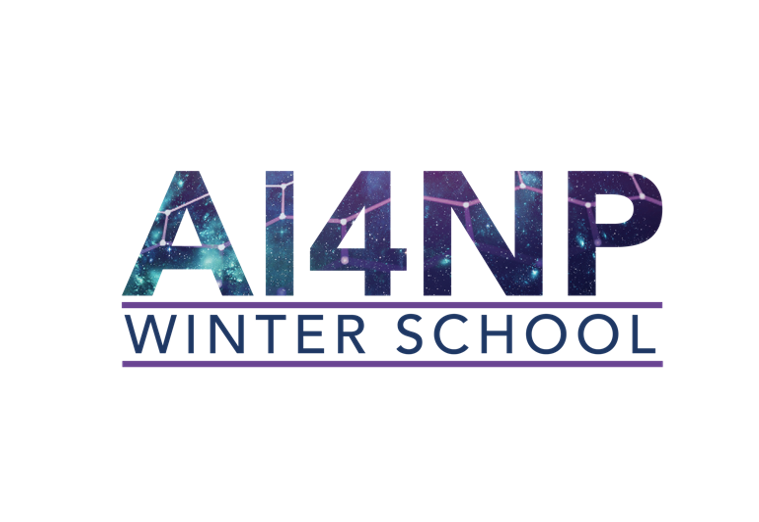More than 300 participants from around the world have signed up
to explore artificial intelligence’s game-changing role
in nuclear physics research
NEWPORT NEWS, VA – Artificial intelligence is a game-changer in nuclear physics, able to enhance and accelerate fundamental research and analysis by orders of magnitude.
The U.S. Department of Energy's Thomas Jefferson National Accelerator Facility is exploring the expanding synergy between nuclear physics and computer science as it co-hosts together with The Catholic University of America and the University of Maryland a virtual weeklong series of lectures and hands-on exercises Jan. 11-15 for graduate students, postdoctoral researchers and even “absolute beginners.”
The Artificial Intelligence for Nuclear Physics (AI4NP) Winter School is designed to show how AI and machine learning can be used to analyze data, perform theoretical calculations, and design new detectors, controls and calibration systems for nuclear physics experiments, according to Tanja Horn, who co-organized the school along with Amber Boehnlein from Jefferson Lab and Paulo Bedaque from the University of Maryland.
Horn is a jointly appointed professor of physics at The Catholic University of America in Washington, D.C., and a senior staff scientist at Jefferson Lab. She has been collaborating with her colleagues since 2001 on precision measurements of the pion and kaon structure cross-sections, which can lead to a better understanding of their mass.
For Horn, the larger appeal of a deeper understanding of subatomic particles is to improve, at least incrementally, humankind’s fundamental understanding of nature.
“Physics, to me, is always the most fundamental approach to do that,” Horn said. “If you think about other sciences, all of them share the observational aspects, but physics is the interesting part in that you, in principle, can express what’s going on around us in simple equations. It’s kind of fascinating that you would be able to, potentially, write one equation which could explain everything, including diseases.”
Better toolkits
Experiments to study subatomic particles typically produce mountainous amounts of data that then need to be painstakingly and laboriously analyzed. Artificial intelligence and machine learning can mobilize computational technologies to augment or automate those analyses in a fraction of the time.
Data analytics methods are an essential underlying technology throughout fundamental science research, Horn said. Artificial intelligence has long led to uber-rapid advances in standard toolkits for analytics that produce technological breakthroughs in areas like automation and medical imaging.
In nuclear physics, AI is especially valuable in optimizing detector systems — a key part of the world-class experiments conducted at Jefferson Lab using its powerful Continuous Electron Beam Accelerator Facility, a particle accelerator complex and DOE User Facility that serves nearly 1,700 nuclear physicists worldwide.
Now, more physicists are hastening to harness AI and machine learning to their fullest potential and to get up to speed on the newest advances.
“With rapid developments in the toolkits,” Horn said, “it’s extremely important to have training and educational opportunities for people conducting basic research in nuclear physics, or for simply maintaining up-to-date data skills, or for possibly applying and taking advantage of AI.”
She believes the AI4NP Winter School will help enlist and educate young scientists toward that end.
“It’s difficult to overstate the importance of bringing young people, students, into this whole effort to create or to explore the new ideas that will be required for the progress of all of this field,” Horn said.
Filling a niche
Young people have proven they’re eager to participate. Before the global COVID-19 pandemic hit last February, the Winter School had initially planned to max out enrollment at 50 in-person participants. After the pandemic forced the school to go virtual, enrollment rocketed to 317 participants and counting from across five continents.
“It’s amazing, the response,” Horn said. “We didn’t expect that many. We saw some students who are computer science-focused but are interested in nuclear physics, but also the other way around. So, this is a very good combination, because it would represent that synergy we are hoping for with the school.”
The enthusiastic response also suggests physics and computer science students haven’t had enough opportunities to join or attend a school that combines the two disciplines, she said.
“So perhaps the school is a niche,” said Horn. “And will potentially be the first one in a series and could continue for years.”
The school is loosely organized over five days, with the first four dedicated to a morning lecture followed by hands-on exercises:
Monday: Neural Networks and Deep Learning
Tuesday: Variational Monte Carlo and Machine Learning
Wednesday: Data Set Feature Extraction
Thursday: Detector Design Optimization
Friday: Discussions of the week’s topics
Lecturers are Michelle Kuchera, a computational physicist at Davidson College in North Carolina; physicists Alessandro Lovato and Corey Adams of DOE’s Argonne National Laboratory in Illinois; Cristiano Fanelli, a research scientist at the Massachusetts Institute of Technology; and nuclear theorist Nobuo Sato of Jefferson Lab. All were selected by an eight-person advisory committee.
Funding support for the Winter School is through the U.S. Department of Energy, with additional support from Jefferson Lab, The Catholic University of America, and the University of Maryland.
By Tamara Dietrich
Contact: Kandice Carter, Jefferson Lab Communications Office, kcarter@jlab.org


